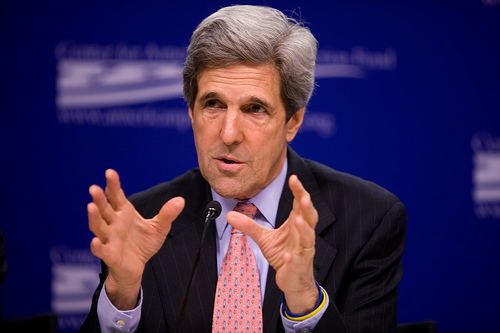Over a year ago, President Obama drew a “red line” in the sand regarding Syria’s use of chemical weapons. When asked whether the US military would get involved to ensure the safekeeping of chemical weapons in Syria, the President responded, “We have been very clear to the Assad regime, but also to other players on the ground, that a red line for us is we start seeing a whole bunch of chemical weapons moving around or being utilized.” Last month, chemical weapons were used to kill over 1,000 Syrian citizens. President Obama has determined that, as the red line was crossed, America must send a message to Assad and the Syrian government that their actions have consequences. Obama and Secretary of State John Kerry have been all over the airwaves working to convince Americans that we must intervene in Syria. A recent Gallup poll shows 51% of Americans oppose military action in Syria. Here are some key reasons many remain unconvinced that American intervention is necessary:
-
There is no direct threat to the United States: What happened in Syria, while horrific, was perpetuated on Syrians, by Syrians. There was never any threat to the United States nor to American citizens. Given the myriad issues demanding attention domestically (the implementation of the Affordable Care Act, the rapidly re-approaching debt ceiling and proposed changes to immigration policy, to name a few), America should not allocate its valuable time and resources to a situation that has nothing to do with us. If America wanted to take on the mantle of World Police, we would have taken action to stop the genocide taking place in the Darfur region of Sudan. We didn’t, nor have we involved ourselves in many other regions of the world where the government routinely harms its own people. Unless or until there is a direct threat to America, we do not need to take action.
-
We have no reason to believe our actions would bring about change: In a recent statement, Secretary of State John Kerry told the press that US actions in Syria would be an “unbelievably small, limited kind of effort”. In another interview Kerry stated that the US action would last no more than 2-3 days and would not involve any troops on the ground. While I agree that we should not get ourselves overly involved (in fact, I vote for staying out of it entirely), I do not see how a minimal gesture would really make any impact in Syria or send a message to any other countries in the region with similar regimes.
-
We really don’t know whom we would be supporting: Members of Congress, including Senator John McCain, have pushed for America to support Syrian rebels to bring down the Assad regime. The problem is we really don’t know whom we would be supporting. “The enemy of my enemy is my friend” is not sound policy, particularly with friends like these. The rebels are a diverse group; many are al-Qaeda members. As we observe the twelfth anniversary of the 9/11 attacks, it is not lost on us that in helping the rebels we would in some cases be supporting the same terror cells that attacked our country and our people. In recent weeks there have been reports of rebels attacking Christian villages, including one instance where a priest was beheaded. The New York Times ran a story last week that depicted the merciless brutality of the Syrian rebels. There is no real ally in this situation.
-
The only consistency has been inconsistency: The Obama administration’s position on Syria seems to change with every statement given. For several years now, President Obama has held the position that the United States needed to extricate itself from Middle East affairs. As he said recently, his role has been to get us out of actions in the Middle East, not to begin new ones. Yet he now believes involvement is essential. Further, Obama has gone from a Senator who slammed President Bush for initiating any military action without Congressional approval, to stating that he needed no approval to act himself, to stating in his Rose Garden press conference on Syria that while he felt justified to act on Syria himself, he would take the issue to a vote before Congress. Timing has also been inconsistent regarding actions against Syria. When Secretary of State Kerry addressed the American people, he stressed the urgency of the situation, calling for swift, decisive action. The very next day, President Obama told a different story in his Rose Garden speech. He stated that while action was necessary, the timeline was flexible and in fact there was no need to call Congress back into session immediately, instead suggesting Congress debate the Syria issue when they returned from recess over a week later. Finally, the scope of the campaign seems to be in flux. Last week, ABC’s Jonathan Karl noted:
“The president’s national security team is preparing for a significantly larger military attack than most had anticipated. The air campaign which is expected to last at least two days will potentially include an aerial bombardment of missiles and long range bombs fired from B-2 and B-52 bombers flying from the United States. That in addition to a relentless assault of Tomahawk missiles fired from those four Navy destroyers in the eastern Mediterranean. Those ships are loaded with nearly 200 missiles, plans call for firing the vast majority of them. As one senior national security official told ABC News, this military strike could do more damage to Assad’s forces in 48 hours than the Syrian rebels have done in nearly two years of civil war. That’s more than President Obama seemed to be suggesting just days ago.”
As an aside, why do we feel the need to broadcast our detailed plans to the world? I am sure the Assad regime appreciates the heads-up. Yet, they may have little to fear, given Secretary Kerry’s minimizing characterization of the actions. Perhaps our real strategy is to confuse the enemy?
Of course, all of this debate may be for naught, as Obama and Kerry both suddenly pivoted to say that the whole thing could be off the table if Syria hands over their stockpiles of chemical weapons. How that negates the crossing of the “red line” that the President now claims he never set is unclear; how that “sends a message” that their actions were unacceptable is unknown as well. It is precisely because of the many unknowns and inconsistencies that America should not vote for military action in Syria.




